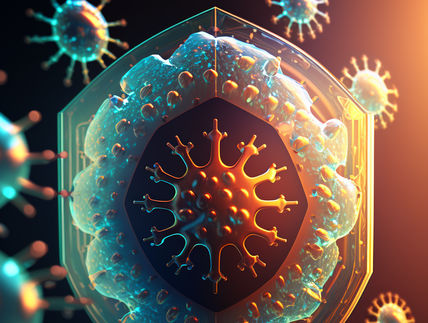Videos with cold symptoms activate brain regions and trigger immune response
Study on brain activity and antibody concentration
People who watch videos of sneezing or sick people show increased activity in brain regions that represent an interface between the brain and the immune system and react to potential dangers. At the same time, the concentration of antibodies in their saliva increases. The findings of a study by researchers from the Department of Biology at the University of Hamburg indicate that an important part of the immune system responds even before a pathogen enters the body. The results were published in the journal "Brain Behavior and Immunity".
Throughout human history, communicable diseases, especially respiratory viral infections such as SARS-CoV-2 or influenza, have been among the main factors influencing human mortality. The constant threat of pathogen transmission has led to the development of various physiological mechanisms of the immune system - for example, the body releases proteins to defend itself against pathogens.
In order to reduce the probability of contact with pathogens, humans also have a repertoire of behavioral adaptations, the so-called behavioral immune system. It helps to recognize smells or visible signs in the environment as indications of pathogens and triggers avoidance behaviour and feelings such as aversion or disgust.
Scientists from the Department of Biology at the University of Hamburg have now gained insights into the interaction of the two immune systems in a study. Sixty-two participants watched short videos showing either people with or without infectious signs of illness. During this time, their brain activity was measured using functional magnetic resonance imaging.
In addition, the researchers also investigated the first defense reactions of the immune system. To do this, they measured the release of secretory immunoglobulin A (sIgA) in saliva. SIgA is the most important antibody for fighting pathogens in the respiratory tract and is normally released when pathogens come into contact with the mucous membranes. However, there is also evidence of a proactive release of sIgA in response to signs of illness, which the two researchers have already been able to demonstrate in previous studies.
"The perception of sneezing and sick people compared to non-contagious people activated the anterior insula, a brain region that is involved in interoception, i.e. the perception of physiological reactions of one's own body, and which represents an important interface between the brain and the immune system. In addition, the test subjects showed an increased release of sIgA analogous to the strength of insular activity," says Dr. Esther Diekhof, head of the Neuroendocrinology working group at the Department of Biology at the University of Hamburg and author of the study. "This indicates a central role of this brain region in the control of the humoral immune response, which prepares the oral mucosa for the expected pathogen contact, e.g. when someone sneezes in the immediate vicinity."
"In contrast, the amygdala - a brain region involved in emotional responses such as fear and anxiety - showed increased activation in all videos in which people were seen. This indicates a non-specific alertness to the presence of people," adds Judith Keller, PhD student in the Neuroendocrinology research group and also author of the study.
"Taken together, the study results show a mechanism for processing cues of infection. While the insula coordinates central immune activation, the amygdala could function more as an alarm system for social situations with an increased risk of transmission," says Diekhof. "This immune response could help people to deal with the risk of infection by activating countermeasures and preparing the body for the expected pathogen load."
Note: This article has been translated using a computer system without human intervention. LUMITOS offers these automatic translations to present a wider range of current news. Since this article has been translated with automatic translation, it is possible that it contains errors in vocabulary, syntax or grammar. The original article in German can be found here.
Original publication
Other news from the department science
Most read news
More news from our other portals
See the theme worlds for related content
Topic world Antibodies
Antibodies are specialized molecules of our immune system that can specifically recognize and neutralize pathogens or foreign substances. Antibody research in biotech and pharma has recognized this natural defense potential and is working intensively to make it therapeutically useful. From monoclonal antibodies used against cancer or autoimmune diseases to antibody-drug conjugates that specifically transport drugs to disease cells - the possibilities are enormous

Topic world Antibodies
Antibodies are specialized molecules of our immune system that can specifically recognize and neutralize pathogens or foreign substances. Antibody research in biotech and pharma has recognized this natural defense potential and is working intensively to make it therapeutically useful. From monoclonal antibodies used against cancer or autoimmune diseases to antibody-drug conjugates that specifically transport drugs to disease cells - the possibilities are enormous





















































